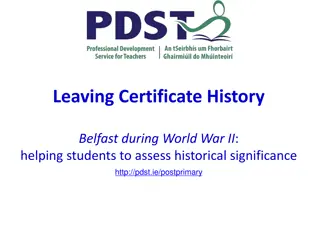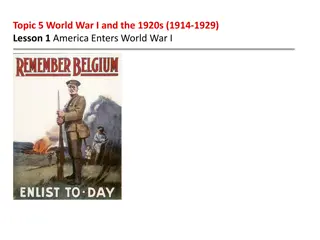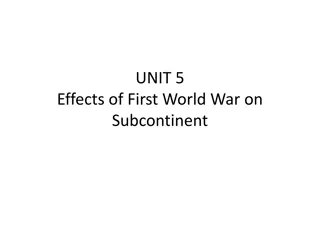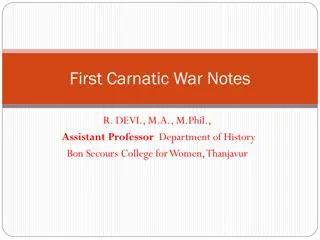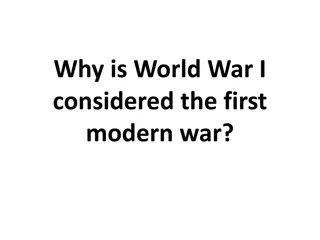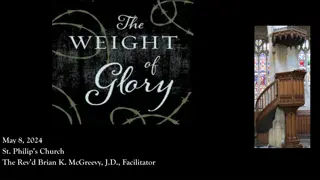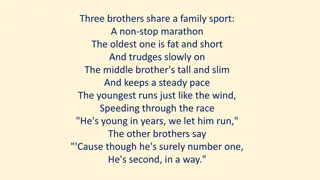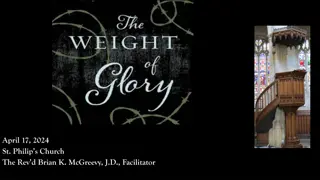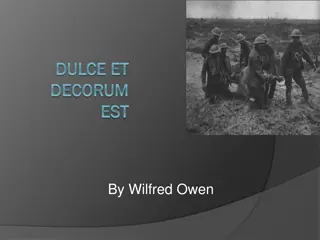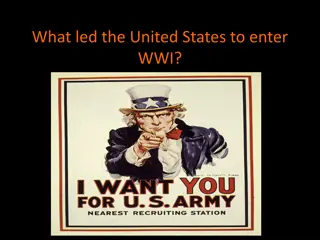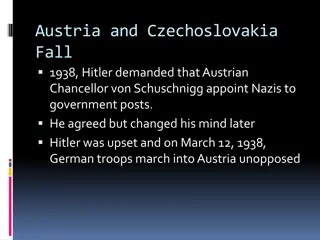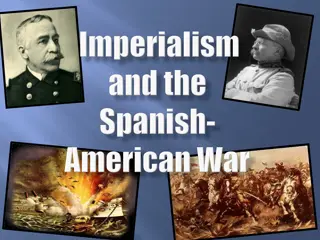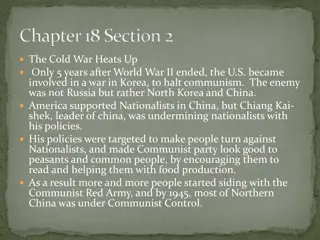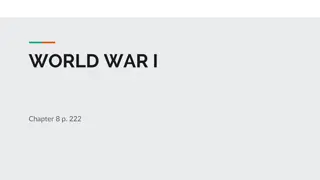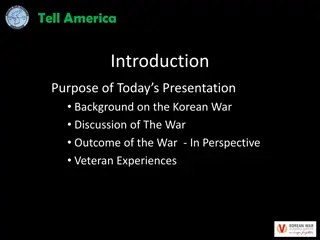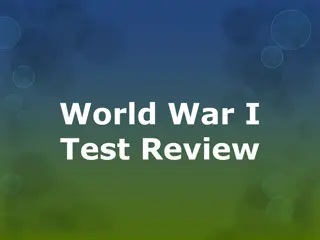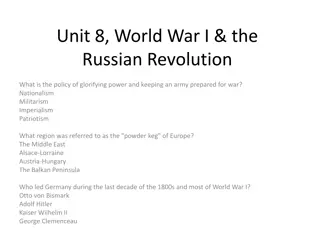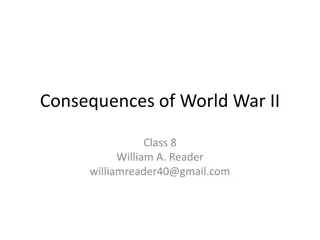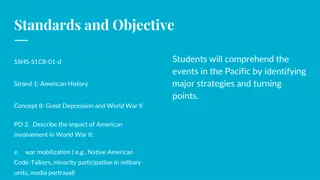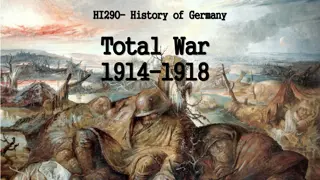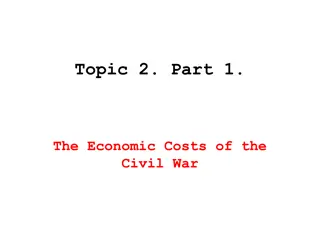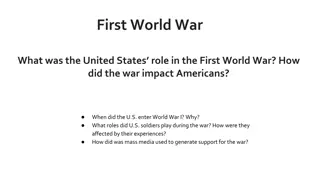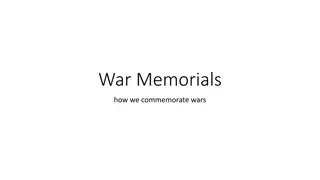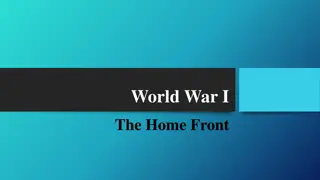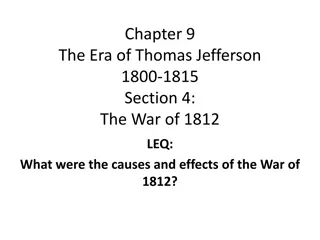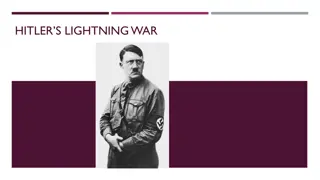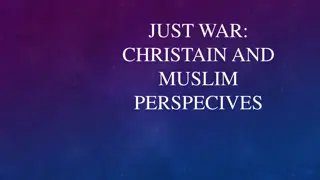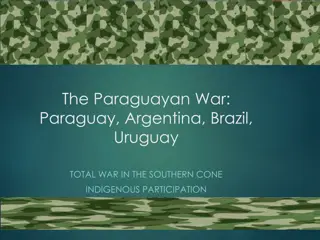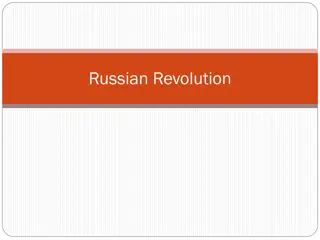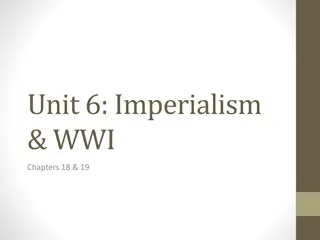❤[PDF]⚡ Civil War Talks: Further Reminiscences of George S. Bernard and His Fel
\"COPY LINK HERE ; https:\/\/getpdf.readbooks.link\/0813931754\n\nRead ebook [PDF] Civil War Talks: Further Reminiscences of George S. Bernard and His Fellow Veterans (A Nation Divided: Studies in the Civil War Era) | Civil War Talks: Further Reminiscences of George S. Bernard and His Fellow Vetera
1 views • 6 slides
Exploring Historical Significance of Belfast During World War II
Assisting students in assessing the historical significance of Belfast during World War II through an enquiry-focused approach. The content covers key aspects such as the impact of World War II on Belfast, its strategic importance, political leadership, the Belfast Blitz of 1941, and key terms relat
0 views • 32 slides
America's Entry into World War I: Causes and Impacts
World War I and the 1920s witnessed America's transition from neutrality to active involvement in the war. Factors such as nationalism, militarism, imperialism, and alliances led to the conflict. The impact of technological innovations resulted in stalemate on the Western Front, leading to significa
0 views • 11 slides
The Homefront: U.S. War Production Efforts During World War II
During World War II, the United States mobilized its industries for total war production, converting peacetime factories into facilities for producing planes, tanks, rifles, and more. The U.S. became the Allies' biggest armaments supplier, producing millions of war supplies and significantly boostin
2 views • 25 slides
Effects of First World War on Subcontinent
World War I, also known as the Great War, had significant negative impacts on the Indian subcontinent. Indians faced difficulties on the home front due to massive recruitment efforts, high taxes, and price hikes. The war led to a drain of wealth, food shortages, and a fall in the standard of living.
0 views • 7 slides
Carnatic Wars in the 18th Century: Conflict between Indian and British East India Companies
Carnatic Wars were a series of military conflicts in the mid-18th century between the Indian Company, British East India Company, and various independent rulers. Total of three wars were fought - First Carnatic War (1746-48), Second Carnatic War (1749-1754), and Third Carnatic War (1757-1763). The w
1 views • 12 slides
The First Carnatic War: A Historical Overview
Fought between English and French forces in the Carnatic region of Southern India from 1746 to 1748, the First Carnatic War was a significant conflict in colonial history. Led by key figures like Governor-General Dupleix and Major Stringer Lawrence, the war resulted in an inconclusive outcome with t
0 views • 6 slides
Origins of the Cold War: Yalta and Potsdam Conferences 1945
The Cold War's origins stem from the tensions and suspicions between the USSR and the West post-World War II, highlighted through conferences like Yalta and Potsdam. At the Yalta Conference, held in February 1945, crucial decisions were made regarding Germany, Poland, and the UN. The Potsdam Confere
0 views • 10 slides
Insights into World War Two and Adolf Hitler's Role
World War Two started on September 3, 1939, with Britain and France declaring war on Germany. Adolf Hitler's rise to power, initiation of the war, and involvement in the Holocaust are highlighted. The Star of David symbolized Jewish identity under Hitler's rule, and the Holocaust saw six million Eur
0 views • 6 slides
World War II Overview: Causes, Holocaust, and US Involvement
Explore the causes of World War II, including appeasement and the rise of fascism, learn about the devastating Holocaust, and understand the start of the war with Hitler's actions. Delve into the US preparations for war, including the Pearl Harbor attack and internment camps, as it entered the confl
0 views • 7 slides
Understanding World War I as the First Modern War
Explore why World War I is recognized as the initial modern war, delving into its technological advancements, tactics, and impact on warfare evolution. Discover the defining elements that distinguish it from previous conflicts.
0 views • 7 slides
Reflections on C.S. Lewis' Sermons during World War II
Explore the impactful sermons and addresses delivered by C.S. Lewis during World War II, focusing on themes of faith, resilience, and hope amidst the turmoil of war. The collection includes notable pieces like "Learning in War-time" and "The Weight of Glory," offering profound insights and wisdom fo
1 views • 23 slides
Historical Events and Learnings in World War I Era
In this collection of historical topics, explore events such as the three brothers in a marathon, war strategies in World War I, and GCSE History lessons covering Germany and Britain. Learn about significant battles, alliances, and key figures from this era, including Kaiser Wilhelm II. A starter qu
0 views • 21 slides
Exploring C.S. Lewis' Sermons in the Context of World War II
Delve into C.S. Lewis' impactful sermons given during World War II and the turbulent times in England, focusing on themes of faith, inner strength, and contemplation in the face of adversity. The sermons, such as "Learning in War-time" and "The Weight of Glory," offer profound insights that resonate
0 views • 23 slides
Analysis of W.B. Yeats' Poetry During World War I
W.B. Yeats' poetry during World War I reflects a unique perspective on the conflict, as seen in works like "An Irish Airman Foresees His Death" and "On Being Asked for a War Poem." Delving into themes of sacrifice, duty, and the futility of war, Yeats offers a contrasting view to the graphic realism
0 views • 7 slides
The Poetry and Context of Wilfred Owen in World War One
Wilfred Owen, a renowned war poet, captured the horrors of World War One through his powerful poetry. This summary delves into Owen's life, the war in brief, the impact on poetry, and early responses to the conflict.
0 views • 26 slides
Why the United States Entered World War I
The United States initially remained neutral during World War I, but various factors led to its eventual entry into the conflict. Growing anti-German sentiments, impact of the war on the American economy, incidents like the sinking of the Lusitania, and the revelation of the Zimmerman Telegram all p
0 views • 18 slides
Key World War II Conferences and Agreements
Explore the significant World War II conferences such as the Atlantic Charter, Casablanca, Tehran, Yalta, and Potsdam. Understand the key agreements reached between the US, Britain, and the Soviet Union, shaping the post-war landscape. Delve into the goals, declarations, and decisions that impacted
0 views • 7 slides
Timeline of Key Events Leading to World War II
In the years leading up to World War II, a series of significant events unfolded in Europe. From Hitler's demands and annexations to the signing of pacts and the invasion of Poland, tensions escalated rapidly. The Munich Agreement, German offensive in Poland, declaration of war by France and Britain
0 views • 12 slides
The Impact of the Korean War on Global Relations
The Korean War, often dubbed the "Forgotten War," had significant implications on global politics and relationships. This conflict was characterized by a mix of conventional and guerilla warfare tactics. China's involvement in the war had a profound impact on its relations with the U.S. and the U.S.
0 views • 14 slides
The Spanish-American War: Origins and Impact
The Spanish-American War was fueled by a combination of factors including economic struggles, imperial ambitions, and sensationalist journalism. Theodore Roosevelt's stance on war, coupled with the desire for Cuba's independence from Spain, led to a call for war in the late 1890s. Yellow journalism
0 views • 18 slides
The Cold War Heats Up: Korea and China Conflict
The post-World War II era saw the U.S. engaging in the Korean War to combat communism, facing off against North Korea and China instead of Russia. Conflict in China between the Nationalists led by Chiang Kai-shek and the Communists under Mao Tse-tung intensified, with Chiang's authoritarian rule spa
0 views • 14 slides
Causes and Outbreak of World War I
Various factors such as nationalism, imperialism, militarism, and the assassination of Archduke Francis Ferdinand led to the outbreak of World War I. The tensions in Europe escalated as countries formed alliances and mobilized for war. The conflict resulted in early battles like the Battle of Marne
0 views • 23 slides
Overview of the Korean War: Background, Discussion, and Outcome
This presentation delves into the background of the Korean War, highlighting the historical context from the Korean Peninsula's division after World War II to the outbreak of the conflict in 1950. It discusses the involvement of North and South Korea, as well as key players like the United States, t
0 views • 15 slides
World War I Test Review and Historical Overview
Learn about the key terms and concepts related to World War I, including militarism, nationalism, neutrality, propaganda, espionage, and more. Explore the long-term causes of the war, the immediate trigger, the Central Powers and Allied Powers involved, as well as important events like the Zimmerman
0 views • 13 slides
World War I and the Treaty of Versailles: Key Events and Consequences
The policy of glorifying power and militarism, the tensions in the Balkan Peninsula, Germany's leadership, causes of the United States' entry into World War I, impact of unrestricted submarine warfare, transition to total war, the end of the war with an armistice, the Treaty of Versailles assigning
0 views • 10 slides
The Impact of World War II on Japan and the Emergence of the Cold War
World War II had far-reaching consequences on Japan, leading to significant naval battles, intense fighting in Okinawa, and ultimately, the country's surrender following the atomic bombings of Hiroshima and Nagasaki. The post-war period saw the emergence of the Cold War as tensions rose between the
0 views • 63 slides
Impact of American Involvement in World War II Pacific Theater
Explore the pivotal events in the Pacific Theater of World War II, including the fall of the Philippines, the harrowing Bataan Death March, the strategic Doolittle Raid, and the crucial role of Navajo Code Talkers. Delve into the war mobilization efforts, reflecting on the bravery and sacrifices mad
0 views • 16 slides
Factors Leading to World War I and the Impact of the Schlieffen Plan
The factors that led to World War I include alliances, economic rivalries, and an arms race. The July Crisis in 1914 triggered a series of events leading to the war. The Spirit of 1914 reflected the initial enthusiasm, while the Burgfriede saw political truce. The Schlieffen Plan failed due to unexp
0 views • 17 slides
The Economic Costs of the Civil War and Its Impact on Growth
The Civil War led to significant economic costs for both the North and the South, including direct expenses such as government spending, destruction of physical and human capital, and indirect costs due to reduced consumption. The war resulted in massive casualties and had a profound impact on the e
0 views • 34 slides
Insights into World War I Through Visual Discovery
Explore significant events and experiences of World War I through imagery and primary sources. Delve into the assassination of Franz Ferdinand, the technology used in the war, the grim reality of trench warfare, and the psychological toll on soldiers. Gain a deeper understanding of the impact and le
0 views • 20 slides
The United States in World War I: Impact, Soldiers' Experiences, and Media Support
The United States played a significant role in World War I, entering the war in 1917 and sending soldiers to fight in Europe. The war impacted Americans socially and economically. U.S. soldiers served in various roles and were affected by their experiences. Mass media was used to generate support fo
0 views • 15 slides
Honoring Sacrifice: War Memorials Across the Globe
Explore a visual journey through various war memorials such as the Boer War Memorial in Belfast, the Menin Gate in Ypres, the Cenotaph in London, the Tomb of the Unknown Warrior in Westminster Abbey, the Korean War Veterans Memorial in Washington DC, the Vietnam Veterans Memorial Wall in Washington
0 views • 9 slides
America's Role on the Home Front during World War I
During World War I, America witnessed significant changes on the home front as the government took on new powers to regulate industry, agriculture, and public opinion. Women and minorities played crucial roles, voluntary rationing was embraced, and opposition by conscientious objectors was met with
0 views • 24 slides
The War of 1812: Causes, Events, and Effects
The War of 1812 was influenced by issues such as British impressment of American sailors, arming Native Americans, and trade restrictions. Despite opposition, President James Madison declared war in 1812. The conflict marked a period of American nationalism, with War Hawks pushing for war and Doves
0 views • 16 slides
World War II: Hitler's Lightning War and Its Impact
Germany sparked a new war in Europe by signing a nonaggression pact with the Soviet Union and executing a lightning attack on Poland in 1939. Subsequent events, including the fall of France, the Battle of Britain, and developments on the Eastern Front, shaped the course of World War II.
0 views • 10 slides
Perspectives on Just War Theory from Christian and Muslim Standpoints
Just War Theory, rooted in Christian philosophy, aims to justify the use of force in specific circumstances to defend justice and protect human life. While pacifists reject all forms of war, adherents of the theory believe in certain criteria that must be met for a war to be considered just, such as
0 views • 16 slides
The Paraguayan War: Total Conflict in the Southern Cone
The Paraguayan War, also known as the War of the Triple Alliance, involved Paraguay, Argentina, Brazil, and Uruguay in a brutal conflict from 1864 to 1870. President Carlos Antonio López's policies and the ambitions of Francisco Solano López led to Paraguay's defiance of its neighbors, resulting i
0 views • 10 slides
Overview of the Russian Revolution and World War I
In this informative content, the Russian Revolution and World War I are explored in detail. Topics covered include the main causes of WWI, the phases of the Russian Revolution, the impact of World War I on Russia, and the consequences of the Russian Civil War. The content also delves into the pre-re
0 views • 14 slides
United States Foreign Policy Evolution from Imperialism to World War I
Explore the United States' foreign policy evolution from Imperialism to World War I, including the Open Door Policy, Dollar Diplomacy, and involvement in the Spanish-American War. Learn about the military actions in acquiring territories such as Puerto Rico, Guam, Philippines, and Hawaii. Delve into
0 views • 8 slides
![❤[PDF]⚡ Civil War Talks: Further Reminiscences of George S. Bernard and His Fel](/thumb/20551/pdf-civil-war-talks-further-reminiscences-of-george-s-bernard-and-his-fel.jpg)
